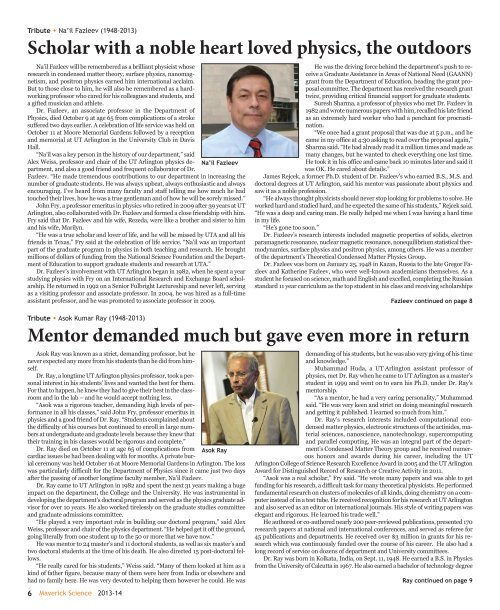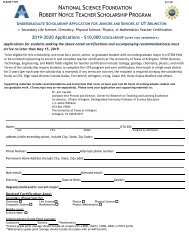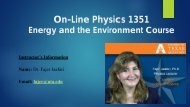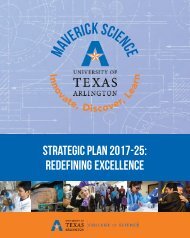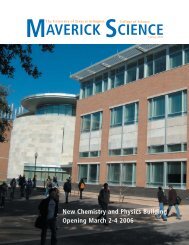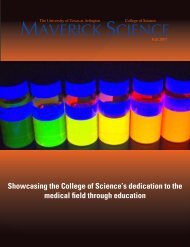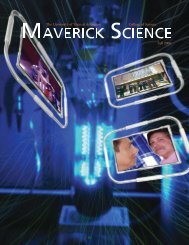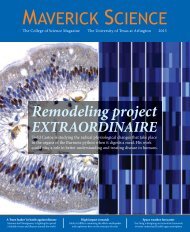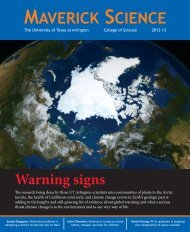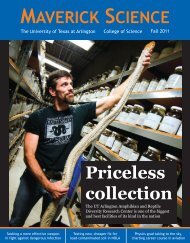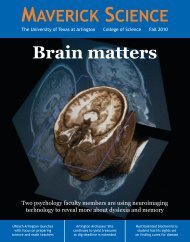Maverick Science mag 2013-14
You also want an ePaper? Increase the reach of your titles
YUMPU automatically turns print PDFs into web optimized ePapers that Google loves.
Tribute w Na’il Fazleev (1948-<strong>2013</strong>)<br />
Scholar with a noble heart loved physics, the outdoors<br />
Na’il Fazleev will be remembered as a brilliant physicist whose<br />
research in condensed matter theory, surface physics, nano<strong>mag</strong>netism,<br />
and positron physics earned him international acclaim.<br />
But to those close to him, he will also be remembered as a hardworking<br />
professor who cared for his colleagues and students, and<br />
a gifted musician and athlete.<br />
Dr. Fazleev, an associate professor in the Department of<br />
Physics, died October 9 at age 65 from complications of a stroke<br />
suffered two days earlier. A celebration of life service was held on<br />
October 11 at Moore Memorial Gardens followed by a reception<br />
and memorial at UT Arlington in the University Club in Davis<br />
Hall.<br />
“Na’il was a key person in the history of our department,” said<br />
Alex Weiss, professor and chair of the UT Arlington physics department,<br />
and also a good friend and frequent collaborator of Dr.<br />
Na’il Fazleev<br />
Fazleev. “He made tremendous contributions to our department in increasing the<br />
number of graduate students. He was always upbeat, always enthusiastic and always<br />
encouraging. I’ve heard from many faculty and staff telling me how much he had<br />
touched their lives, how he was a true gentleman and of how he will be sorely missed.”<br />
John Fry, a professor emeritus in physics who retired in 2009 after 39 years at UT<br />
Arlington, also collaborated with Dr. Fazleev and formed a close friendship with him.<br />
Fry said that Dr. Fazleev and his wife, Rezeda, were like a brother and sister to him<br />
and his wife, Marilyn.<br />
“He was a true scholar and lover of life, and he will be missed by UTA and all his<br />
friends in Texas,” Fry said at the celebration of life service. “Na’il was an important<br />
part of the graduate program in physics in both teaching and research. He brought<br />
millions of dollars of funding from the National <strong>Science</strong> Foundation and the Department<br />
of Education to support graduate students and research at UTA.”<br />
Dr. Fazleev’s involvement with UT Arlington began in 1982, when he spent a year<br />
studying physics with Fry on an International Research and Exchange Board scholarship.<br />
He returned in 1992 on a Senior Fulbright Lectureship and never left, serving<br />
as a visiting professor and associate professor. In 2004, he was hired as a full-time<br />
assistant professor, and he was promoted to associate professor in 2009.<br />
Tribute w Asok Kumar Ray (1948-<strong>2013</strong>)<br />
6 <strong>Maverick</strong> <strong>Science</strong> <strong>2013</strong>-<strong>14</strong><br />
He was the driving force behind the department’s push to receive<br />
a Graduate Assistance in Areas of National Need (GAANN)<br />
grant from the Department of Education, heading the grant proposal<br />
committee. The department has received the research grant<br />
twice, providing critical financial support for graduate students.<br />
Suresh Sharma, a professor of physics who met Dr. Fazleev in<br />
1982 and wrote numerous papers with him, recalled his late friend<br />
as an extremely hard worker who had a penchant for procrastination.<br />
“We once had a grant proposal that was due at 5 p.m., and he<br />
came in my office at 4:30 asking to read over the proposal again,”<br />
Sharma said. “He had already read it a million times and made as<br />
many changes, but he wanted to check everything one last time.<br />
He took it in his office and came back 10 minutes later and said it<br />
was OK. He cared about details.”<br />
James Rejcek, a former Ph.D. student of Dr. Fazleev’s who earned B.S., M.S. and<br />
doctoral degrees at UT Arlington, said his mentor was passionate about physics and<br />
saw it as a noble profession.<br />
“He always thought physicists should never stop looking for problems to solve. He<br />
worked hard and studied hard, and he expected the same of his students,” Rejcek said.<br />
“He was a deep and caring man. He really helped me when I was having a hard time<br />
in my life.<br />
“He’s gone too soon.”<br />
Dr. Fazleev’s research interests included <strong>mag</strong>netic properties of solids, electron<br />
para<strong>mag</strong>netic resonance, nuclear <strong>mag</strong>netic resonance, nonequilibrium statistical thermodynamics,<br />
surface physics and positron physics, among others. He was a member<br />
of the department’s Theoretical Condensed Matter Physics Group.<br />
Dr. Fazleev was born on January 25, 1948 in Kazan, Russia to the late Gregor Fazleev<br />
and Katherine Fazleev, who were well-known academicians themselves. As a<br />
student he focused on science, math and English and excelled, completing the Russian<br />
standard 11 year curriculum as the top student in his class and receiving scholarships<br />
Fazleev continued on page 8<br />
Mentor demanded much but gave even more in return<br />
Asok Ray was known as a strict, demanding professor, but he<br />
never expected any more from his students than he did from himself.<br />
Dr. Ray, a longtime UT Arlington physics professor, took a personal<br />
interest in his students’ lives and wanted the best for them.<br />
For that to happen, he knew they had to give their best in the classroom<br />
and in the lab – and he would accept nothing less.<br />
“Asok was a rigorous teacher, demanding high levels of performance<br />
in all his classes,” said John Fry, professor emeritus in<br />
physics and a good friend of Dr. Ray. “Students complained about<br />
the difficulty of his courses but continued to enroll in large numbers<br />
at undergraduate and graduate levels because they knew that<br />
their training in his classes would be rigorous and complete.”<br />
Dr. Ray died on October 11 at age 65 of complications from Asok Ray<br />
cardiac issues he had been dealing with for months. A private burial<br />
ceremony was held October 16 at Moore Memorial Gardens in Arlington. The loss<br />
was particularly difficult for the Department of Physics since it came just two days<br />
after the passing of another longtime faculty member, Na’il Fazleev.<br />
Dr. Ray came to UT Arlington in 1982 and spent the next 31 years making a huge<br />
impact on the department, the College and the University. He was instrumental in<br />
developing the department’s doctoral program and served as the physics graduate advisor<br />
for over 10 years. He also worked tirelessly on the graduate studies committee<br />
and graduate admissions committee.<br />
“He played a very important role in building our doctoral program,” said Alex<br />
Weiss, professor and chair of the physics department. “He helped get it off the ground,<br />
going literally from one student up to the 50 or more that we have now.”<br />
He was mentor to 24 master’s and 11 doctoral students, as well as six master’s and<br />
two doctoral students at the time of his death. He also directed 15 post-doctoral fellows.<br />
“He really cared for his students,” Weiss said. “Many of them looked at him as a<br />
kind of father figure, because many of them were here from India or elsewhere and<br />
had no family here. He was very devoted to helping them however he could. He was<br />
demanding of his students, but he was also very giving of his time<br />
and knowledge.”<br />
Muhammad Huda, a UT Arlington assistant professor of<br />
physics, met Dr. Ray when he came to UT Arlington as a master’s<br />
student in 1999 and went on to earn his Ph.D. under Dr. Ray’s<br />
mentorship.<br />
“As a mentor, he had a very caring personality,” Muhammad<br />
said. “He was very keen and strict on doing meaningful research<br />
and getting it published. I learned so much from him.”<br />
Dr. Ray’s research interests included computational condensed<br />
matter physics, electronic structures of the actinides, material<br />
sciences, nanoscience, nanotechnology, supercomputing<br />
and parallel computing. He was an integral part of the department’s<br />
Condensed Matter Theory group and he received numerous<br />
honors and awards during his career, including the UT<br />
Arlington College of <strong>Science</strong> Research Excellence Award in 2005 and the UT Arlington<br />
Award for Distinguished Record of Research or Creative Activity in 2011.<br />
“Asok was a real scholar,” Fry said. “He wrote many papers and was able to get<br />
funding for his research, a difficult task for many theoretical physicists. He performed<br />
fundamental research on clusters of molecules of all kinds, doing chemistry on a computer<br />
instead of in a test tube. He received recognition for his research at UT Arlington<br />
and also served as an editor on international journals. His style of writing papers was<br />
elegant and rigorous. He learned his trade well.”<br />
He authored or co-authored nearly 200 peer-reviewed publications, presented 170<br />
research papers at national and international conferences, and served as referee for<br />
45 publications and departments. He received over $3 million in grants for his research<br />
which was continuously funded over the course of his career. He also had a<br />
long record of service on dozens of department and University committees.<br />
Dr. Ray was born in Kolkata, India, on Sept. 11, 1948. He earned a B.S. in Physics<br />
from the University of Calcutta in 1967. He also earned a bachelor of technology degree<br />
Ray continued on page 9


